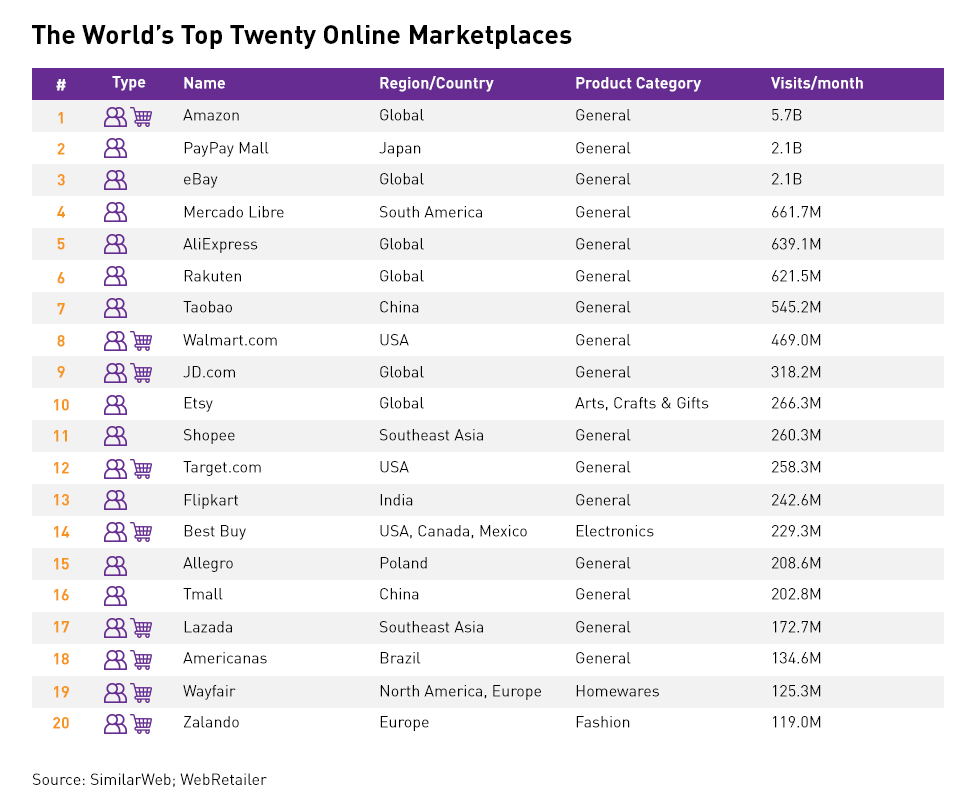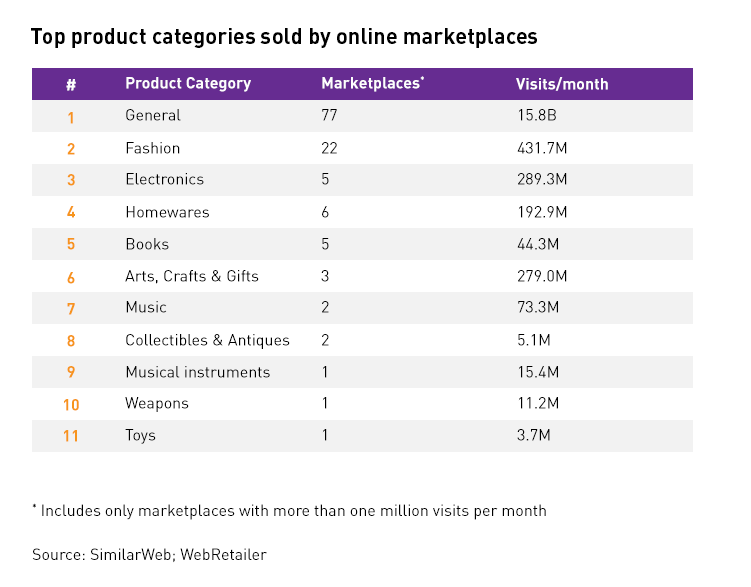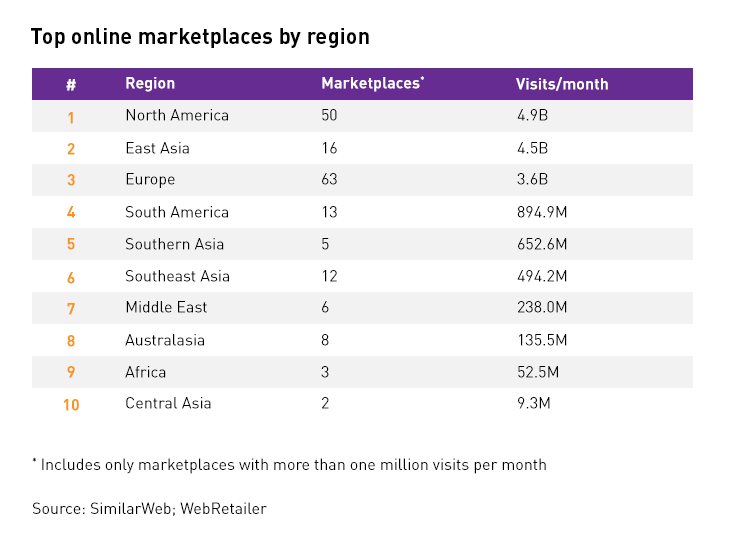
In this new normal, where online shopping is increasingly a necessity rather than a choice, online marketplaces have become a habitual shopping destination for a wider audience, including those consumers that were initially more hesitant about exploring the world of online marketplaces.
In 2019, online sales via marketplaces accounted for 57% of the overall ecommerce sector, which, when translated into numbers, corresponds to $2.03 trillion, a 20% increase on 2018 sales. This important role played by marketplaces in the global economy is strengthening year after year, indeed it has been forecasted to experience an exponential surge in the next five years. Further evidence in support of this prediction is evident in the figures of the latest DigitalCommerce360 report. According to the study, 93% of online consumers have shopped on marketplaces in 2020 and 37% of online sellers have recalibrated their marketplace strategy to keep up with the increasing consumer demand caused by Covid-19.
Amazon and eBay are the most common marketplaces results on search engines when consumers shop online, however, the global ecommerce landscape includes an incredible variety of marketplaces which operate in different continents and sell from a wide range of general products to niche and specialised items. The world’s top online marketplaces classified according to monthly visits by SimilarWeb shows the diversification which characterises marketplaces and reveals interesting insights on online shoppers’ preferences for product categories and regions.

In the top twenty players, only six of them have a global presence and, excluding Etsy, none of them is specialised in a particular product category. As expected, Amazon and eBay are the marketplaces that reach billion visits every month and, with a note of surprise from Westerners PayPay Mall is globally the second most visited ecommerce platform. Formerly known as Yahoo.co.jp, PayPay Mall was launched last year and it has become the largest online marketplace in Japan, followed by Amazon Japan and Rakuten. The name PayPay Mall comes from Yahoo’s PayPay mobile payment app, which has been inspired by Alibaba’s PayPay Flea example.
From a business model perspective, the top twenty marketplaces are divided between the marketplaces that only trade products listed by their sellers, and marketplaces that are also retailers themselves. The ecommerce giant, Amazon, is a great example of the successful combination of being a marketplace and also a retailer. Born as a book and music retailer, Amazon launched in 2000 and its marketplace business model success today is testified in the fact that 50% of Amazon’s online sales are made by its sellers. Apart from Amazon, other well-known marketplaces are also retailers such as Walmart.com, JD.com, Target.com and Lazada.
By analysing the marketplaces that have only over a million monthly visits, the majority of the marketplaces are not focused on selling any specific product category and reach a total of 15.8 billion visits a month.
Second place in the ranking belongs to the shopping platforms operating only in the fashion sector and only four of the 22 marketplaces have a global presence including ASOS, Farfetch, Depop and Moda Operandi. Even though the majority of fashion marketplaces sell globally and in US, the marketplace reigning in this niche sector trades only in Europe. Zalando hits 119.0 million monthly visits and it doesn’t sell only via sellers, but it also excels as a retailer.

Behind fashion, there are three product categories that perform very well but are less competitive as there is a fewer number of marketplaces specialised in them. Best Buy and Newegg are the marketplaces dominating the electronics category, although we should point out that the major attraction of these marketplaces aren’t general electronic devices, but video games and related accessories. While Wayfair is the top homeware player, Etsy is the most visited marketplace in the homemade and gifts category, also ranking in the top twenty marketplaces.
Although there are marketplace giants that have a global influence as shopping destinations, the SimilarWeb’s recent report shows how consumer shopping preferences vary from region to region. While Amazon followed by eBay are institutions in the American, British, Australasian and European ecommerce landscape, they lose their position at the top of the ranking in Asia, Middle East, South America and Africa where other regional marketplaces prevail. This explains why it is wise to investigate deeply the shopping behaviour, preferences and platforms of the specific area of interest before building a cross-border strategy.

As showed in the table above, American and European shoppers undeniably consult a higher variety of marketplaces when purchasing online, compared to the rest of the world. Also, they are characterised by visiting marketplaces that are focus for the majority in the region, such as Walmart and Target in the US, Allegro and Zalando in Europe. However, these regions are different when considering the niche marketplaces. According to WebRetailer, 51% of US marketplaces focus on a specific niche category, while 44% in Europe.
The Asian ecommerce landscape is characterised by a great shopping preferences diversification as each region has different marketplaces at the top of the raking, which usually operate only in the regional area. As mentioned earlier, the Japanese marketplace PayPayMall is the second most visited marketplace in the world, and it is also the first in Japan with over 2 billion national consumers’ visits. In China, Taobao and JD.com are the top players, while Shopee and Lazada are the most preferred in Southeast Asia.
Similarly, over 60% of South American shoppers consult regional marketplaces to purchase online, such as Mercado Libre and Americanas, with the only exception of three global marketplaces and a Shopee, Southeast Asian marketplace.
We Are Pentagon is a market-leading service and technology provider, trusted by major brands and retailers including Dixons, Dyson, Next, Arcadia Group and Sports Direct to sell into global marketplaces. Pentagon is currently trading on behalf of its clients on 80+ marketplaces such as Amazon, eBay, Catch, Cdiscount, Coupang, Lazada, Rakuten Ichiba and more. In this new normal where marketplaces have an increasing influence and role, we are the go-to solution to accelerate your global growth and deliver on your ecommerce strategy. Contact us today to book a free 1:1 consultation with our ecommerce experts.

Let us develop a tailored solution for your business that will help you reach new international customers and grow your global sales.
get in touch